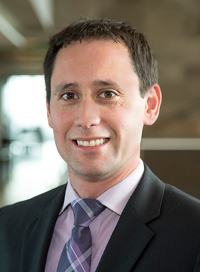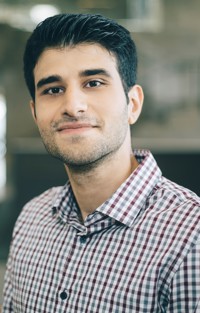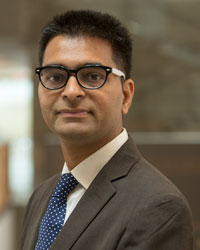Marketing is fundamentally concerned with the description and prediction of decision outcomes, involving all aspects of the firm that relates to its customers, competitors, distributors, and business regulators. It is an interdisciplinary field that draws theories and methodologies from a variety of sources including psychology, sociology, mathematics, statistics and economics.
The doctoral program in Marketing is designed to produce scholars. We train our graduates to become academics in a university setting. We aim to produce teachers and researchers. If your interest is consulting, industry or other non-university sector employment, you would be better to pursue a MBA or MSc degree.
Marketing doctoral students take a series of courses, including research methods, marketing theory, consumer behavior, judgment and decision making, experimental design and others drawn from non-business areas such as economics, psychology, statistics and sociology. Other aspects of the program are tailored to fit the student’s own research, teaching and professional interests.
In the marketing seminars, students normally participate in sessions related to their areas of expertise and research interests. Students consider recent scholarly work in the field, develop research approaches, increase their understanding of conceptualizations and models, and develop the ability to solve managerial problems in marketing. The seminars are sequenced so that in one seminar you will be with others who have entered the program earlier, and in a second seminar, with those who enter the program after you.
Areas of Research Focus
- Psychology of money
- Financial decision-making
- Gambling
- Experiential consumption and emotions
- Social influence
- Big data and machine learning
- B2B and B2C relationships
- Branding
- Marketing strategy
- Addiction
- Temporal perception and consumption
- Self-control and consumption
- Political marketing
- Charitable behaviour
PhD Student Opportunities
A small but highly competitive cohort of students is accepted into the marketing stream of the PhD program every year. Students have varied experiences coming from industry, Master's programs, and government. Supervisory relationships among faculty members and students are close and begin soon after entering the program. As such, it is recommended that applications are tailored to highlight alignment with specific faculty members and their corresponding areas of research focus, which are listed above and available on faculty webpages (e.g., June Cotte, Rod Duclos, Guneet Kaur Nagpal, Miranda Goode, Kirk Kristofferson, Zhe Zhang).
Frequent interactions allow marketing faculty to personalize students’ coursework and to guide development of a research project pipeline that merges overlapping interests with their unique backgrounds. In addition to Ivey’s competitive internal funding structure, marketing PhD students have a strong record of securing additional external funding, both provincially and federally, and our graduates attain tenure track positions at attractive institutions in Canada, Unites States, and Europe. The Marketing group welcomes applications from qualified candidates.
PhD Graduates
The doctoral program in Marketing is designed for those interested in pursuing academic careers in marketing at top business schools.
Dr. Poornima Vinoo (2022 PhD)
Assistant Professor, Indian School of Business

Two Essays on Everyday Financial Decisions
Every day consumers make numerous financial decisions which have the potential to increase or decrease their wellbeing in the short-term or long-term. For instance, choosing to pay only the minimum due on a credit card bill can increase liquidity and wellbeing in the short-term, but increase debt and decrease wellbeing in the long-term. My work examines two such instances of everyday financial decisions which influence consumer wellbeing...Read more about this thesis
Dr. Michael Moorhouse (2021 PhD)
Assistant Professor, Lazaridis School of Business and Economics, Wilfred Laurier University

Transactions in the peer-to-peer sharing economy carry high risk and uncertainty. Consumers exchange with non-professional providers with whom they have no past history, and must rely on ratings and reviews for choice selection. However, there is a large positive bias in the ratings, making differentiation difficult, and causing some consumers to lose trust. Despite these concerns, little progress has been made to demonstrate the cause of the bias or how it can be fixed. I address this gap by demonstrating that consumers evaluate peer-peer experiences based on trust. This trust evaluation, in concert with network and social factors, contributes to the bias...Read more about this thesis
Dr. Jun Hyun (Joseph) Ryoo (2021 PhD)
Assistant Professor, W. P. Carey School of Business, Arizona State University

Essays on Information Asymmetry and Leakage
Since the underlying qualities of products and firms are not readily apparent, information asymmetry exists at the heart of marketing. This dissertation investigates information asymmetry that is present specifically between: (1) firms and consumers, and (2) firms and investors. I advance our knowledge of how information asymmetry can be reduced in beneficial ways for the firm either by voluntary or involuntary means...Read more about this thesis
Dr. Amir Sepehri (2021 PhD)
Assistant Professor, ESSEC Business School

Ideas Worth Spreading? Adverse Effects of Information Load in Online Communications
What makes public addresses such as online talks successful vs. not? Across seven field and lab studies, I find that information overload hurts consumer adoption. The cause? Processing disfluency. Information overload makes a message more difficult to process, which in turn reduces liking and interest. The effect disappears among audience members with greater need for cognition, a personality trait marking a penchant for deep and broad information-processing. My empirical investigation concludes by documenting the counter-intuitiveness of the findings (i.e., how consumers mispredict which talks they actually (dis)like)... Read more about this thesis
Dr. Peter Nguyen (2019 PhD)
Assistant Professor, Miami University in Ohio

Two Essays on Consumer-Generated Reviews: Reviewer Expertise and Mobile Reviews
Over the past few decades, the internet has risen to prominence, enabling consumers to not only quickly access large amounts of information, but also openly share content (e.g., blogs, videos, reviews) with a substantially large number of fellow consumers. Given the vast presence of consumers in the online space, it has become increasingly critical for marketers to better understand the way consumers share, and learn from, consumer-generated content, a research area known as electronic word-of-mouth. In this dissertation, I advance our understanding about the shared content generated by consumers on online review platforms... Read more about this thesis
Dr. Vivek Astvansh (2018 PhD)
Associate Professor of Quantitative Marketing and Analytics, McGill University

Toward a Better Understanding and Management of Product Recall
Product recalls have become increasingly common across product categories and countries. Although recalls pose adverse consequences for businesses, regulatory agencies, and society, they also test these stakeholders’ resilience in the face of adversity. Perhaps because scholars from multiple disciplines have studied recalls for nearly four decades now, a large number of terms, most of which stay undefined, has been used to describe recalls and several closely related yet distinct phenomena. We also lack a framework that can help synthesize our knowledge and guide us toward questions that are both interesting and relevant. Finally, there has been no attention to the fundamental question of what firm actions drive the effectiveness of recalls...Read more about this thesis
